
In preparation of the Review of the outcome of the UN World Summit on the Information Society (WSIS) 2003 in Geneva and 2005 in Tunis by the UN General Assembly in fall 2014, the UN – in a remarkable multi-stakeholder process by Governments and Civil Society – reaffirmed last week in Geneva the potential of ICTs to promote peace and to prevent conflict.
In the Preamble of the Outcome Document of June 2014 the UN inter alia states:
“The information and communication technologies (ICTs) have also demonstrated their value as a facilitator and development enabler in reaching the Millennium Development Goals (MDGs). However, major challenges still lay ahead for counteracting the wide disparities in development and enabling all groups and all countries to benefit from universal access to information and knowledge. Moreover reaping the benefit of ICTs use has yet not been shared in all countries proportionately. In particular we reaffirm paragraph 36 of the Tunis Commitment regarding the potential of ICTs to promote peace and to prevent conflict.”
The referenced Paragraph 36 of the WSIS Tunis Commitment in 2005 reads as follows:
“We (the Heads of States and Government) value the potential of ICTs to promote peace and to prevent conflict which, inter alia, negatively affects achieving development goals. ICTs can be used for identifying conflict situations through early warning systems preventing conflicts, promoting their peaceful resolution, supporting humanitarian action, including protection of civilians in armed conflicts, facilitating peacekeeping missions, and assisting post conflict peace-building and reconstruction.”
The new paragraph in the June 2014 Outcome document as well as paragraph 36 of the WSIS Tunis Commitment of 2005 was proposed for adoption by ICT4Peace’s Daniel Stauffacher.
The latter based on the findings of the ground-breaking report by ICT4Peace: The report “Information and Communication Technology for Peace: the role of ICT in preventing, responding to and recovering from conflict” (by D. Stauffacher, W. Drake, P. Currion and J. Steinberger) with a preface by UN Secretary General Kofi Annan and a foreword by Swiss Foreign Affairs Minister Micheline Calmy-Rey. The report mapped out different possible uses of ICT in the areas of early warning and conflict prevention, mediation operations and support, protection of civilians and post-conflict reconstruction. Cross-cutting areas such as the use of the internet, the role of the media, technical development, networking and learning were also investigated. The report was published as part of the UN ICT Task Force Series.
